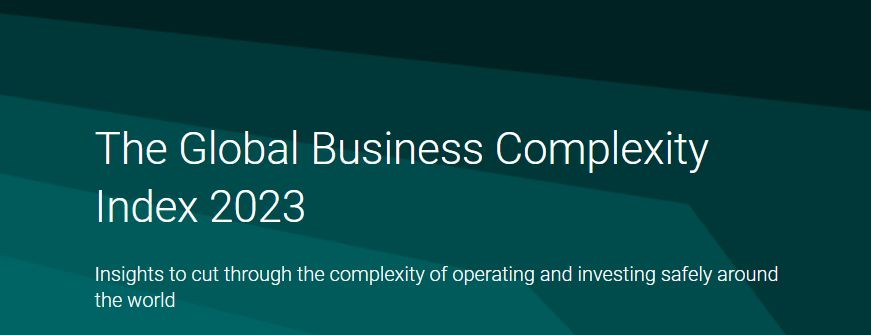Poland has been ranked fourth in Europe among the least business-friendly countries for the third consecutive year, according to this year’s report compiled by TMF Group, a leading provider of compliance and administrative services. Globally, our country ranks 12th. The hardest place in the world to do business is France. The report also identifies three key themes shaping the global business landscape and regulatory environment.
The comprehensive report analyses 78 jurisdictions which account for 92% of the world’s total GDP and 95% of net global FDI flows. It compares 292 annually tracked indicators, offering data on key aspects of doing business, including incorporation timelines, payroll and benefits, rules, regulations, tax rates, and other compliance factors.
For the third time in a row, Poland has found itself in the group of four countries where it is most difficult to do business in Europe, where conditions for running a company are more difficult than in Poland for entrepreneurs in France, Greece and Italy.
At the same time, France won the title of the country in which it is the most difficult to do business in the world. In this position, it replaced Brazil, which fell to third place and had been ‘leading’ the list for the previous two years. The second most difficult country in the world to do business in is Greece.
Poland was ranked 12th in the global ranking, and Argentina pushed it out of the top ten most difficult countries in which to do business. Poland had held 10th position for the last two years.
Among the biggest obstacles for Poland to becoming a business-friendly country, TMF Group experts point out complex reporting standards, the high costs that companies must incur to adapt to regulatory changes that are often introduced in a timeframe that is too short for business, and the high formal and legal requirements for investors compared to other countries.
– Polish accounting and tax regulations are among the most complex. We found this based on a comparison of as many as 128 criteria. An additional challenge for investors is the fact that they are often introduced at short notice. For large organizations, adapting so quickly to such dynamically changing regulations is simply extremely difficult and consequently costly. Investors operating in many markets, including the most business-friendly ones, are accustomed to focusing most of their energy on their core business rather than finding their way through the complexities of regulation. – says Joanna Romańczuk, TMF Group’s Director for Central and Eastern Europe.
Complicated HR and payroll regulations are also a significant challenge for those thinking of doing business in Poland.
– When analyzing regulations related to hiring employees, we considered as many as 115 indicators in each country. Unfortunately, we fare much worse in this comparison than our neighbors and most countries on all continents. For an investor who plans to employ several thousand workers, this is a problem that may lead to a change in the decision to locate his investment. – adds Joanna Romańczuk.
The best in the world at eliminating obstacles to doing business are the Cayman Islands, Denmark, Curaçao, the Netherlands and Hong Kong. The British Virgin Islands, the United Kingdom, New Zealand, Jersey and Malta also feature in the top ten jurisdictions where it is easiest to do business. Missing from this group for the first time in many years was the United States, which ranked just outside the top ten. Their attractiveness for business, as the authors of the report emphasis, remains consistently very high, with new countries such as the Netherlands, the UK and Malta in the lead.
Topping the least business-friendly countries globally were France, Greece, Brazil, Mexico, Colombia, Turkey, Peru, Italy, Bolivia, and Argentina, respectively. Twelfth Poland is still separated from this group by Indonesia.
– The example of Denmark, which has been among the world’s most business-friendly countries for years, or the Netherlands, the United Kingdom and Malta, which were promoted to the top this year, shows that in Europe we can be very business-friendly, even competing with the United States in this respect. It would be good for Poland to join the group of leaders in this respect in the next few years,” concludes Joanna Romańczuk.
The report also identifies key themes shaping the global business landscape and regulatory environment:
Geopolitical and economic turbulence
The study reveals that since 2020, confidence in the economic stability of jurisdictions over the next five years has been waning. Confidence in political, geopolitical and social stability has, however, remained mostly stable. This is surprising given recent global events, such as the Covid-19 pandemic, war in Ukraine and unprecedented rates of inflation around the world.
Since the start of the war in Ukraine, jurisdictions have observed disrupted supply chains and increased energy prices, as well as barriers to international trade. This makes doing business more challenging, particularly across borders. Many jurisdictions that were reliant on Russia and Ukraine for exports like grain and oil are severely impacted, which increased inflation, demonstrating that the impacts of the war are global, not limited to Europe.
Despite political, geopolitical and social expectations remaining stable, there is a sense that businesses may be less open to global expansion than in previous years. In 2020, 74% of those jurisdictions reported that businesses would find it more appealing to operate there over the next five years. This has dropped to 65% in 2023, suggesting that optimism has faded somewhat, and organisations may be taking a more cautious approach over the coming years.
Another worrying indicator is rising inflation, which causes significant issues such as huge price increases on essentials like food, fuel and utilities. As a consequence, employees are seeking more financial support from their employers to make ends meet. This has led to widespread salary demand increases, and workers seeking better opportunities elsewhere. 60% of jurisdictions report that inflation has increased employee attrition. This is often combined with skills shortages to create recruitment and retention challenges for businesses. The ‘great resignation’ is putting pressure on organisations to remain agile and competitive. This is particularly the case in EMEA where almost all (98%) of jurisdictions surveyed are noting this trend.
Global compliance challenges
Compliance requirements, such as reporting on ultimate beneficial owners (UBO) and persons of significant control (PSC), have been a core part of conformity processes in locations around the world in recent years. Regulations such as know your customer (KYC) and anti-money laundering (AML) have been adopted by at least some industries across all jurisdictions.
As a result of geopolitical tensions, jurisdictions are observing a tightening of global compliance regulations such as KYC and UBO reporting. 43% expect further regulatory compliance reporting for businesses within the next year. This will mean that businesses not only have to navigate greater reporting demands, but also may be expected to do so in a more rapid manner than previously.
Due to this pressure and increased complexity, almost half (48%) of jurisdictions report that at least some companies will rethink their expansion goals. This demonstrates the true impact that global compliance legislation and reporting can have, limiting the attractiveness of a jurisdiction and encouraging businesses to look elsewhere.
However, while global compliance incentives can increase complexity, they can also drive the attractiveness of jurisdictions, particularly for private wealth and family office (PWFO) clients who seek safety and security. For instance, in Singapore, a strong and stable regulatory framework and political stability are the key factors that attract foreign investments. Singapore also offers attractive tax incentive schemes that appeal to high-net-worth individuals.
Environmental, social and governance (ESG) considerations
ESG criteria are increasingly prominent, with companies now required to abide by at least one requirement in the majority of jurisdictions, with diversity to the fore. Half of jurisdictions (51%) require companies to abide by laws relating to diversity of the workforce, with over one quarter (27%) requiring companies to report on it.
Almost half (49%) of jurisdictions require all companies to submit reports on employee demographics to government authorities, which has continued to grow year on year (28% in 2020, 41% in 2021, 47% in 2022). In South America, 80% of jurisdictions require all companies to report on employee demographics, followed by 64% of jurisdictions in APAC.
With reporting requirements for ESG likely to increase, and not just for public and listed companies, there be pressure to navigate the new and upcoming legislation. There is an administration and resourcing cost implication which is affecting large and listed companies in multiple locations (cited, for example, by our experts in South Africa).
As the importance of ESG continues to grow, companies will have to navigate new requirements beyond simple box-ticking exercises and commit to reporting on their ESG indicators. However, given that ESG requirements are in their infancy in many jurisdictions, the impacts and future of ESG reporting remains unclear.
The full Global Business Complexity Index 2023 report can be downloaded HERE.




























